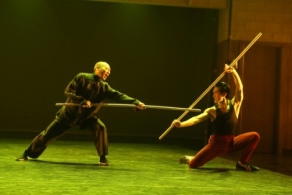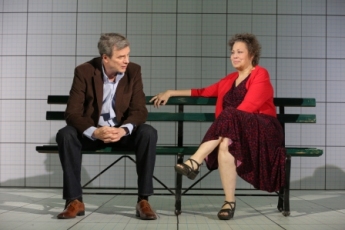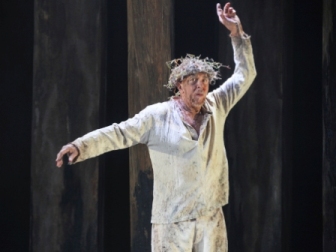Category: "Off-Broadway"
Review: Macbeth
Jun 5th

Kenneth Branagh in Macbeth
(©Stephanie Berger)
It’s doubtful you’ll ever see as compelling and visceral a interpretation of Macbeth as the one being performed for much too brief a run at the Park Avenue Armory. Co-starring Kenneth Branagh and Alex Kingston, this production offers theatrical spectacle on a grand scale that stands in marked contrast to the stripped-down, modern-dress Shakespearean productions that are so often seen around New York. This is a great classic as might be presented by Medieval Times, and that's meant as a compliment.
Co-staged by Branagh and American director Rob Ashford, the production was originally presented last year at the Manchester International Festival in a small church accommodating some 250 theatergoers. Its presentation in the Armory’s vast, 55,000-square-foot drill hall is inevitably far less intimate, but the experience is galvanizing nonetheless.
The proceedings begin with audience members segregated into “clans” such as Cawdor and Glamis and segregated into various rooms awaiting entrance into the drill hall. The groups are escorted separately down a dimly lit path through what looks like a barren field before being led to their seating areas. (There’s a certain gimmickry to these elaborately stage-managed elements that ultimately result in the show starting a half-hour later than advertised.)
The playing area consists of a long dirt path down the center of the hall—the torrential rainstorm accompanying the exciting opening battle sequence quickly transforms it into mud—surrounded on both sides by tiers of benches stretching high into the upper reaches of the building (the backless seats prove awfully uncomfortable over the course of more than two hours). On one end of the playing area is an altar decorated with religious images, while the other features a massive, Stonehenge-like rock formation.
Condensed to a swiftly paced, intermissionless two hours—the judicious cutting is hardly noticeable—the play is given a dramatically rousing, highly physical treatment. The actors bound from one of the muddy strip to the other, giving audience members on both sides ample opportunity to be close to the action (at least for those not seated in the upper sections), although at times it gives one the feeling of watching a tennis match.
Making his long belated New York stage debut, Branagh, whose thrilling film versions of Shakespeare include Henry V and Hamlet, is not surprisingly superb. His naturalistic speaking of the verse is wonderfully comprehensible, and his psychologically astute characterization brings unexpected emotional shadings to a role that has been played in far too perfunctory a fashion by many actors over the years, most recently Ethan Hawke in the lamentable Lincoln Center production.
He’s beautifully matched by Kingston’s emotionally and physically intense turn as Lady Macbeth. Emanating a fierce hysteria and simmering sensuality, the actress makes vividly clear the intense erotic hold the character has over her easily manipulated husband. Among the supporting players, the standouts include Richard Coyle’s commanding Macduff, John Shrapnel’s dignified Duncan, and Scarlett Stallen’s moving Lady Macduff. As the three witches, Charlie Cameron, Laura Elsworthy and Anjana Vasan exude a lithe physicality and spectral spookiness that makes their every appearance memorable.
Gripping theatrical touches abound, from the glowing dagger that mysteriously floats in mid-air to the blazing flames accompanying the more dramatic moments to the vigorously staged fight scenes in which the actors pound into the walls lining the muddy strip with ear-shattering thuds. The elaborate production elements, from Christopher Shutt’s booming sound design to Patrick Doyle’s dramatic musical score, add greatly to the overall effect, although occasional bits of dialogue are swallowed up by the cavernous space despite the amplification.
But despite its occasional problematic aspects, watching Branagh tear into one of the Bard’s meatiest roles is a privilege that is only enhanced by the incredibly imaginative theatricality of this unforgettable production.
Park Avenue Armory, 643 Park Ave. 212-933-5812. www.armoryonpark.org. Through June 22.
Review: Kung Fu
Feb 25th

Frances Jue and Cole Horibe in Kung Fu
(©Joan Marcus)
The title of David Henry Hwang’s bio-play about Bruce Lee is ironic in a way that the screen icon would surely have appreciated. It refers not only to the martial arts style for which he was renowned, but also the classic television series he developed as a starring vehicle for himself, only to see a white actor, David Carradine, given the lead role.
Sadly, its title is the most resonant aspect of this stylized effort from the playwright whose previous works include the award-winning M. Butterfly, Golden Child, The Dance and the Railroad and the recent Chinglish. Starring So You Think You Can Dance contestant Cole Horibe in the starring role, this Signature Theatre Company production presents a sketchy, dramatically thin portrait of Lee’s life from his early days in Hong Kong to his eventual return to his birthplace and ascent into screen superstardom after a frustrating sojourn in Hollywood.
The play’s principal theme is Lee’s strained relationship with his domineering father (Frances Jue), whose constant disapproval supposedly led to his intense drive and perfectionism. While it may indeed be true, it’s handled with a Psychology 101 heavy-handedness that fails to sustain interest.
Hwang dutifully touches the biographical bases, including Lee’s relationship with his American wife Linda (Phoebe Strole) and young son Brandon (Bradley Fong); his difficulties getting cast in Hollywood because of his thick accent and the industry’s inherent racism; his martial arts tutoring of such stars as Steve McQueen and James Coburn (Clifton Duncan); and his frustration with his subservient role as Kato in the short-lived television series The Green Hornet. The play ends when he bitterly returns to Hong Kong, a decision that would prove highly fortuitous to his career.
Lee was a fascinatingly complex and charismatic figure, but little of that is apparent here due to the thinness of the writing and the uncharismatic performance by Horibe in his first dramatic role. While the performer certainly possesses the necessary lithe physique and athletic grace, he conveys little of the star’s fierce intensity that galvanized worldwide audiences.
The most striking moments of Leigh Silverman’s fast-paced production are the extensive, beautifully choreographed fight sequences staged by Emmanuel Brown. They manage to be both highly convincing and visually exciting while managing the neat trick of not doing physical harm to the actors. Less felicitous are the numerous dance sequences choreographed by Sonya Tayeh, including an interpretive dance performed to the propulsive Green Hornet theme music and a climactic Chinese-style ballet accompanied by an electronic score. They seem mere filler, tacked on to extend the play’s brief, two hour running time. The non-traditional casting choices are also jarring, including having an African-American actor as Coburn and an Asian-American as TV producer William Dozier.
But the chief problem is the play itself. The flashback sequences depicting Lee’s contentious relationship with his father prove repetitive, and such scenes as when Lee lies immobile on the floor after an injury go on far too long while having little dramatic impact.
Ultimately it all comes across as a misfire, a particularly disappointing one considering the richness of the subject matter and Hwang’s proven ability to explore his themes with greater depth. Kung Fu gives the superficial appearance of making all the right moves, but it fails to land any true body blows.
Pershing Square Signature Center, 480 W. 42nd St. 212-244-7529. www.signaturetheatre.org. Through March 16.
Review: Love and Information
Feb 20th

A scene from Love and Information
(©Joan Marcus)
Caryl Churchill’s new play Love and Information features more than a hundred characters in some fifty short scenes ranging in length from a few seconds to several minutes, presented in rapid-fire succession. Here’s a quick summary of every single one of them:
Just kidding…that exercise would constitute a sheer overload of information. That’s perhaps the point of this typically audacious effort from the experimental playwright who’s given us such noteworthy works as Top Girls, Cloud Nine, Mad Forest and many others. Many of them received their American premieres at the New York Theatre Workshop, which is also presenting this play that debuted at London’s Royal Court Theatre.
Unfortunately, for all the daringness of its conceit, Love and Information is more numbing than illuminating about its titular themes. Resembling a series of half-baked ideas hastily jotted down in a notebook, it offers more potential than substance.
Veering from the comic to the tragic, the theatrical sketches are often frustratingly amorphous. Such moments as when a patient who’s been given a fatal diagnosis asking her doctor how long she has to live, a young woman informing her brother that she’s actually his mother, and a woman trying to explain the concept of physical pain to someone who can’t feel any deliver situations fraught with drama left unexplored.
Others, such as a man boasting about the virtues of his virtual girlfriend (shades of Spike Jonze’s recent film Her) or a waiter delivering countless linguistic variations of the word “table,” feel like undeveloped comedy sketches.
Certainly there’s no faulting the ingenious staging by James Macdonald or the endlessly versatile performances by the large ensemble composed of such estimable performers as Randy Danson, Jennifer Ikeda, Karen Kandel, Kellie Overbey, Maria Tucci, James Waterston and others. The action takes place within a gleaming white cube, with the quicksilver scene changes happening as if by magic. The soundtrack during the blackout transitions--ranging from The Simpsons theme music to industrial noises to the sound of babies crying—often humorously relate to the action.
Considering the sheer volume of the situations presented, it’s not surprising that some of them are amusing, moving or piquant. But few are memorable. The evening, running nearly two numbing hours, feels like the theatrical equivalent of a meal composed entirely of single bites from different dishes. It may fill you up, but it isn’t very satisfying.
Minetta Lane Theatre, 18 Minetta Lane. 800-982-2787. www.ticketmaster.com. Through March 23.
Review: Intimacy
Jan 30th

Laura Esterman and Keith Randolph Smith in Intimacy
(©Monique Carboni)
For a play that features, among other things, masturbation, ejaculations, fellatio, anal sex, suggestions of incest and frottage—look up that last one if you need to—Thomas Bradshaw’s Intimacy is remarkably wholesome.
Indeed, by the time this ribald comedy presented by The New Group reaches its conclusion, all of its characters are in a state of blissful harmony despite the profusion of sexual and racial tensions that have previously threatened to rend them apart.
It concerns three families living near each other in an upscale suburban town. Widower James (Daniel Gerroll) is still grieving for his late wife but finds himself consumed with sexual thoughts despite his stern religiosity. His sex-obsessed teenage son Matthew (Austin Cauldwell), an aspiring filmmaker, voyeuristically spies on Janet (Ella Dershowitz), the sexy girl next door, even while beginning a sexual relationship with Sarah (Dea Julien), the daughter of Fred (David Anzuelo), a contractor who pleasures himself to gay porn. Finally, there are Janet’s parents, bi-racial couple Jerry (Keith Randolph Smith) and Pat (Laura Esterman), whose healthy sex life has apparently inspired their daughter to become a porn actress.
Playwright Bradshaw has repeatedly stated in interviews that he doesn’t consider himself a provocateur, but the assertion seems disingenuous considering this work’s endless representations of sex and bodily functions as exuberantly staged by director Scott Elliott. Full-frontal nudity and graphic sex abounds, and only the most discerning, or close-up, will be able to differentiate the prosthetic penises from the real ones.
When he first learns that his daughter is posing in such magazines as Barely Legal, Jerry is aghast. But he soon finds himself indulging in sexual fantasies about her, even while sarcastically asking, after she comes home from work, “Did you have some nice orgasms?” His sexually liberated wife is far more supportive, arguing that their daughter having sex in front of a camera is simply “a career choice.”
The virginal Sarah won’t allow Matthew to have intercourse with her, but she happily uses his bodily fluids as a medicinal cream for her acne-plagued skin. Meanwhile, he comes to embrace his bi-sexuality after being graphically propositioned by her father.
Resembling nothing so much as a network sitcom if the censors had all been sent packing, the play ultimately centers on Matthew’s deciding to make an all-frottage porn film starring Janet and his father, the latter of whom gleefully sheds his inhibitions after becoming besotted by the comely young woman.
Making the hardly revelatory point that we’re all capable of extreme licentiousness under the right circumstances, the play, for all its graphicness, lacks the anarchic wit that would make it truly thought provoking. It mainly comes across as begging for attention, like a pathetic flasher trying to be caught.
The performers, ranging from such veteran pros as Gerroll, Esterman and Smith to the younger newcomers, are certainly game for anything, shedding their clothes and dignity in strained attempts to induce laughs and gasps. To their credit, they sometimes succeed, but in such moments as when Smith’s harried Jerry takes a relaxing toilet break to the auditory accompaniment of loud farting sounds, it’s hard not to feel sorry for them.
Ultimately, the play is far less than the sum of its, um, parts. Its relative tameness is illustrated when a scene from the notorious porn film Deep Throat is shown on a television monitor. Watching Linda Lovelace perform her trademark sexual act--and it’s impossible not to, despite the live actors onstage-- one is reminded of an earlier time when it was still possible to be genuinely shocked.
Acorn Theatre, 410 W. 42nd St. 212-239-6200. www.telecharge.com. Through March 8.
Review: King Lear
Jan 22nd

Frank Langella in King Lear
(©Richard Termine)
Following in Ian McKellen and Derek Jacobi’s recent footsteps in playing King Lear at BAM’s Harvey Theater, Frank Langella provides further proof that the Bard’s late classic has become an essential milestone for actors of a certain age. This production imported from the Chichester Festival Theatre seems to have little reason to exist other than as a star vehicle. But when you have as magisterial a performer as this one in the title role, not much more is required.
Angus Jackson’s staging is purely of the straightforward variety, with few directorial impositions. Robert Innes Hopkins’ set, dominated by massive wooden pillars, and period costumes, while handsome, are similarly undistracting. Thankfully, the play has not been updated to the fascist era, nor are there video screens to project an air of modernity.
Thus it falls on its star’s broad shoulders to bear the weight of this play which never quite has the psychological coherence that it should. And Langella handles the load with ease, despite his advanced age (he recently turned 76) and relative lack of Shakespearean experience. His performance is not particularly revelatory, but he touches the character’s myriad emotional bases with consummate skill.
His Lear displays few touches of the senility which many of his predecessors have suggested. Rather, he’s physically imposing and authoritative, his powerful baritone voice lending an innate majesty to his line readings. Fittingly, there’s more than a slight hint of one of his most famous roles, Richard Nixon, in his monarch’s inability to fully grasp how his power is slipping away. Railing at his fate while standing in the midst of a torrential rainstorm, he resembles a prehistoric creature in its death throes.
The supporting cast is solid if unspectacular, with a few weak links, such as Isabella Laughland’s bland Cordelia. Catherine McCormack and Lauren O’Neill are suitably fierce as the scheming Goneril and Regan; Denis Conway invests his Gloucester with a stirring gravitas; and Sebastian Armesto handles Edgar’s disguising himself as a madman with daring physical virtuosity. Best of all are Max Bennett, displaying leading man-style charisma as the treacherous Edmond, and Harry Melling (familiar as Dudley Dursley in the Harry Potter films), whose youthful demeanor provides unexpected dimensions to the Fool.
This is a more physical Lear than most, with Langella frequently physically manhandling his fellow players and Gloucester’s blinding depicted with a brutal intensity that wouldn’t be out of place in a horror film (the splats of his gouged out eyes hitting the floor are particularly squirm-inducing). But for all the intensity on display, the production never quite moves us as much as it should. Perhaps it’s time to retire the play for a little while, if only to gain some distance from it. Oh, never mind, there’s another production by Theatre for a New Audience, just around the corner from BAM, opening this spring.
BAM Harvey Theater, 651 Fulton Street, Brooklyn. 718-636-4100. www.bam.org. Through Feb. 9